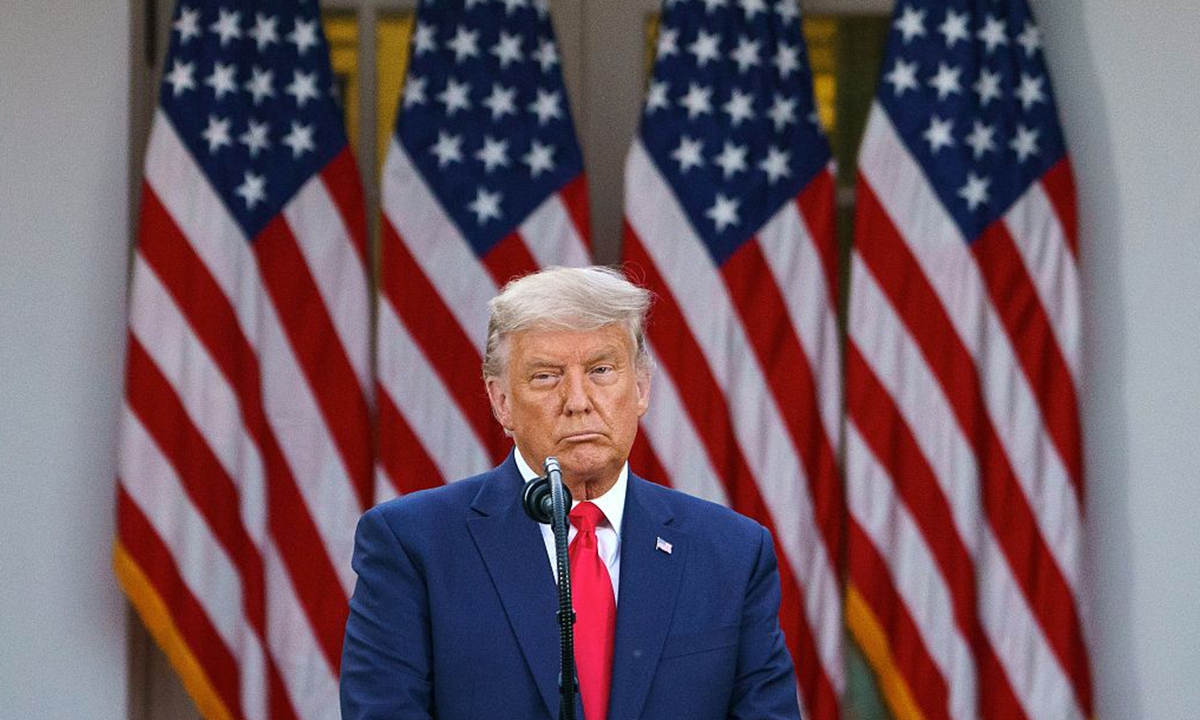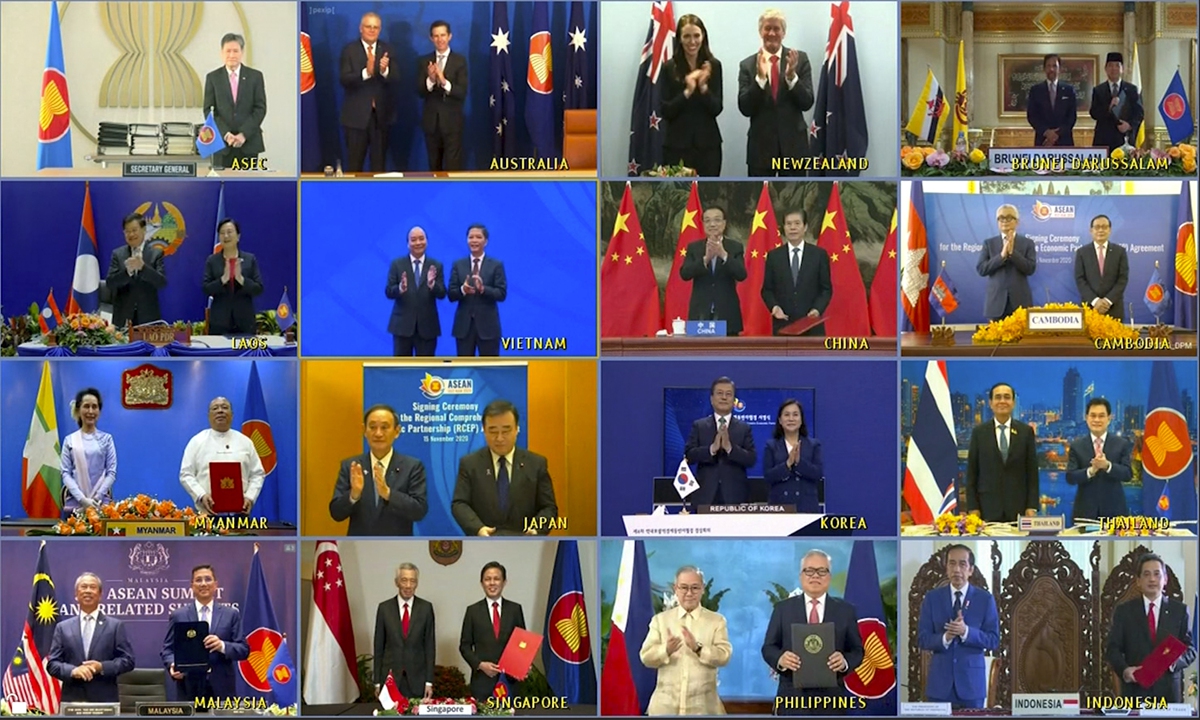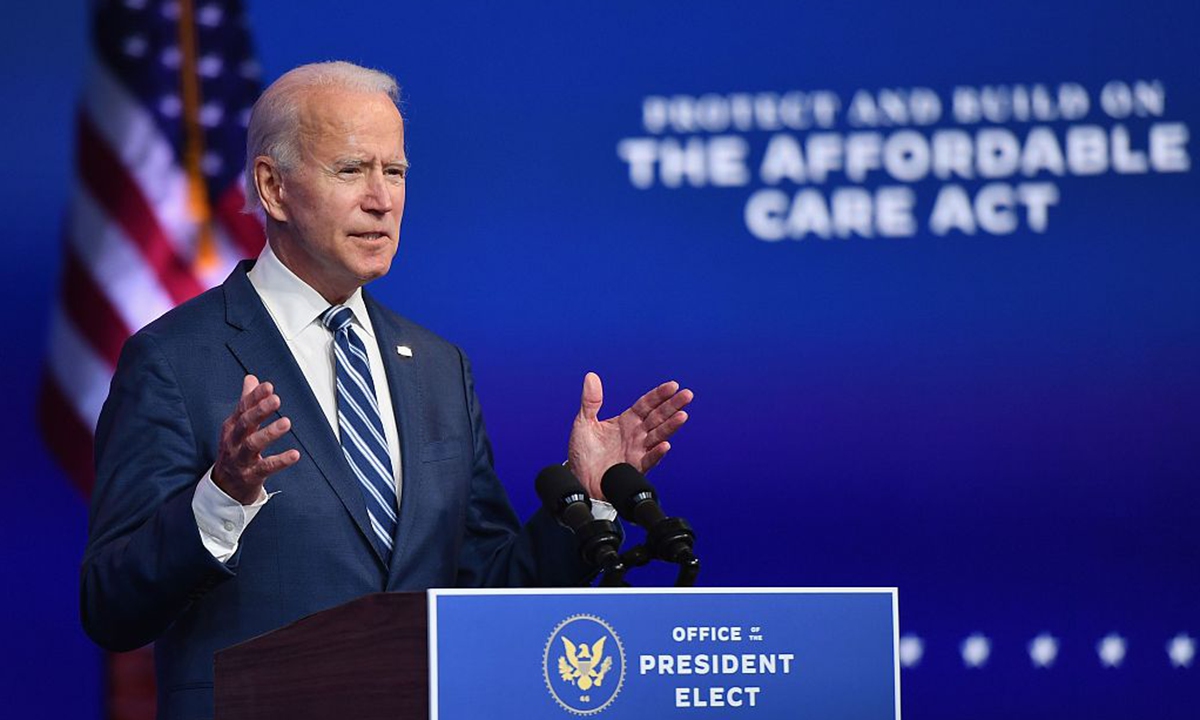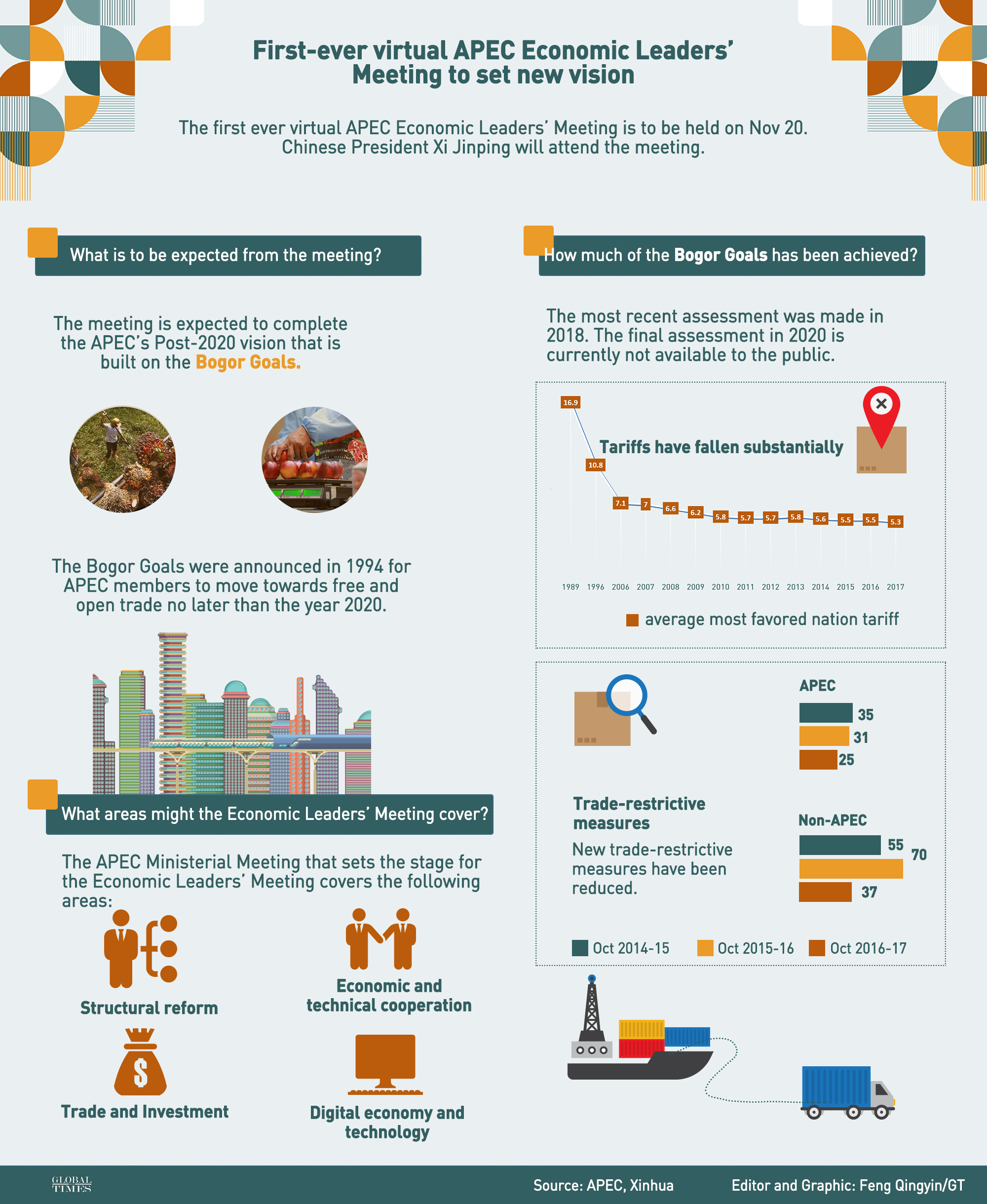APEC expected to react coldly to Trump's presumed unilateralism speech at summit
By Chu Daye and Ma Jingjing Source: Global Times Published: 2020/11/20 11:26:44

Photo:VCG
Unlike in 2017, when the newly elected Trump gained all ears and even applause with his unilateralist rhetoric, world leaders at the APEC forum have seemed to move on with their commitment to inclusive development and support for the multilateral trading system, risking leaving out the US.
While the reported attendance at the virtual APEC summit by Trump, who has yet to concede the recent election and begin a transfer of government to president-elect Joe Biden, has come with some doubt, Chinese observers pointed out the world would be interested in what kind of "farewell message" the outgoing US president will leave; but his unilateralist clichés can almost certainly be expected if he shows up.
With a series of profound global agreements and events yielding results this week, from the inking of the world's largest trade pact by 15 countries in the Asia-Pacific region to APEC leaders focusing on a new vision for cooperation and the Group of 20 summit working on global recovery in the wake of the pandemic, the world will see a lone, influence-shrinking US that cannot align itself with the world's growing trend of cooperation in a post-virus world, experts said.
Global markets are also unlikely to react wildly to a speech by Trump, whose term is expected to end in January. Instead, their attention has already moved on to president-elect Joe Biden.

This image made from a teleconference provided by the Vietnam News Agency (VNA) shows the leaders and trade ministers of 15 Regional Comprehensive Economic Partnership (RCEP) countries pose for a virtual group photo in Hanoi, Vietnam on Sunday. Photo: AP
Waning US influence
Prior to the key regional summit, 15 countries in the Asia-Pacific region signed Regional Comprehensive Partnership Agreement (RCEP) - the world's largest trade agreement - on November 15, offering fresh momentum for multilateral regional and global cooperation in trade and investment.
Speaking at the APEC CEO Dialogues on Thursday, Thai Prime Minister Prayut Chan-o-cha said the success of RCEP "at this pivotal moment will reinvigorate regional economic integration and multilateral trade."
The US only fielded a low-level presence at last weekend's virtual East Asia Summit, when RCEP was signed and the US Chamber of Commerce said on Monday it was concerned the US was being left behind. Back home, Trump was criticized for this.
He Weiwen, a former senior trade official and an executive council member of the China Society for World Trade Organization Studies, said that Trump's appearance will be more of an existence-validating show-up for the outgoing US president, as he is by no means interested in APEC and actually stands on the opposite of what the APEC stands for.
"With his days as US president entering a countdown mode, this show-up would only be a validation. What he said, whether some supportive message to the APEC or more likely, his old talk of 'America First,' will be of little significance to an audience preoccupied with something larger," He told the Global Times on Friday.
With the economic rise of East Asia, the role of the US in APEC has been significantly reduced, Su Hao, founding director of the Center for Strategic and Peace Studies at the China Foreign Affairs University, told the Global Times.
"Whereas Washington can no longer dominate the economy of East Asia, its interest in APEC is declining," Su said.
"But the country is still reluctant to give up because this would be detrimental to maintaining the US' reputation and leadership it established during and following World War II."
Given the US' narrow-mindedness, other Asia-Pacific economies have been more willing to accept regional cooperation without the US, especially when it comes to preventing economic recession amid the global pandemic, Song Guoyou, deputy director of the Center for American Studies at Fudan University, told the Global Times on Thursday.

Joe Biden. Photo: VCG
Unlike Trump, president-elect Joe Biden will probably attach more importance to the APEC as he is more accommodating to multilateralism and regional economic cooperation given the fact that the APEC mechanism was strengthened during the era of former US president Bill Clinton, also a Democrat, Song said.
With the abrupt withdrawal of the US from the so-called Trans-Pacific Partnership (TPP) trade deal — one of the world's largest multinational trade deals including Australia, Japan and Malaysia — and Trump's escalating hardline economic nationalism, the US' influence in the region is declining.
According to the Asia Power Index released by an Australian think tank in October, the US has experienced the largest drop in relative power of any country this year, declining by 3 points to 81.6.
The US' 10-point lead over China two years ago has been cut in half this year.
"However, it's unrealistic if some US politicians think that Biden's different attitude toward APEC would help the US dominate and decide Asia-Pacific affairs over the next few years," Song said.
"Only when the US returns to Asia-Pacific regional cooperation mechanisms can we talk about its leadership in the region," he said, noting that Asia-Pacific countries' economic independence and self-awareness has awakened, as shown in the RCEP and the Comprehensive and Progressive Agreement for Trans-Pacific Partnership (CPTPP) multilateral trade agreements, successor to the TPP, already signed without the US.
He said there is a high possibility of the US returning to the CPTPP.
"But will the US regain its lost influence? That will depend on whether US policies are aligned with common interest in Asia and adhere to multilateralism," He said.
"Still, the US priority initially for the new administration will be definitely Europe, not Asia."

Infographic:GT
Multilateralism trend
During the Friday meeting, APEC leaders are expected to adopt a post-2020 vision which would replace the Bogor Goals and serve as the primary reference point for the region in the coming decades.
The Bogor Goals were set in 1994 and are expected to reach maturity at the end of this year.
APEC leaders are expected to send out a clear message on their commitment to multilateralism and international cooperation, which is essential to fight the pandemic and for a sustainable economic recovery.
APEC's GDP contracted by 3.7 percent in the first six months of 2020 and is expected to contract by 2.5 percent for the whole year, or equal to an output loss of $1.8 trillion, according to APEC Policy Support Unit.
However, East Asia is the world's first region to keep the virus relatively in check and signs of economic recoveries are already being observed in many parts in the region, with China as a leading force in that recovery.
Analysts said APEC member countries are expected to uphold multilateralism, coordinate efforts for recovery and lay down a long-term vision for sustainable growth by continuing championing free and open trade and investment.
Chen Fengying, a research fellow at the China Institutes of Contemporary International Relations, told the Global Times on Friday that a joint statement by APEC could be a vital mechanism for dialogue in the Asia-Pacific, even though many of the past goals of APEC were not met or accomplished on account of rising protectionism and unilateralism.
"A positive message to the world would show the Asia-Pacific is one of the most vital regions for world economic growth," Chen said.
Posted in: CROSS-BORDERS